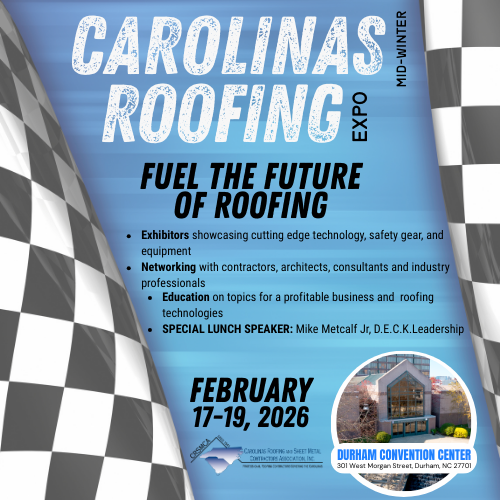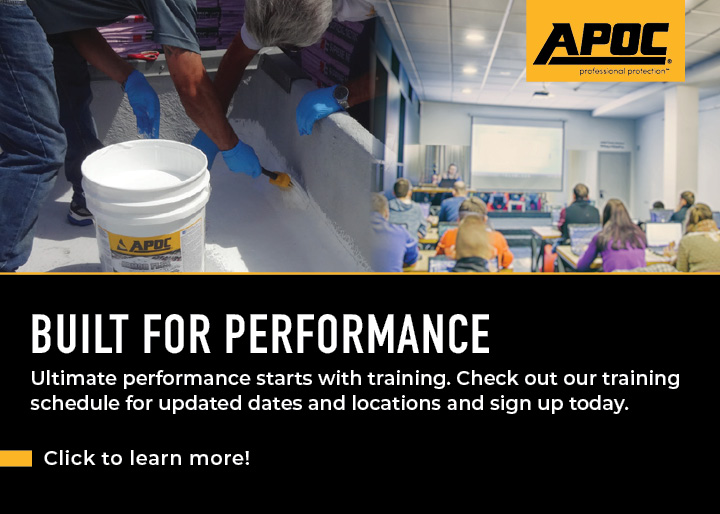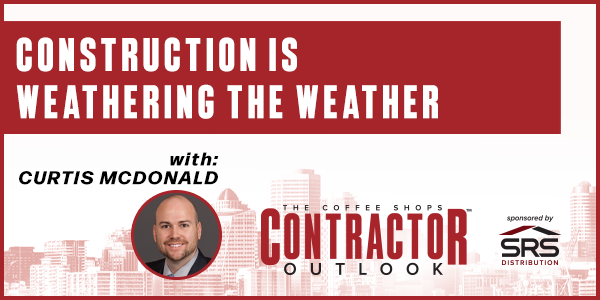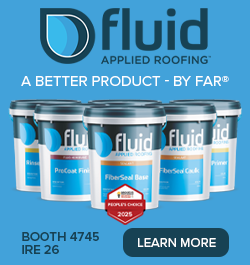UP TO THE MINUTE
Finding Opportunity in Uncertainty - PODCAST TRANSCRIPT
May 15, 2025 at 12:00 p.m.Editor's note: The following is the transcript of a live interview with Will Lorenz from General Coatings and Todd Farr from EVERROOF. You can read the interview below or listen to the podcast.
Intro: Hello, everyone. My name is Megan Ellsworth here at CoatingsCoffeeShop.com. I'm really excited because today we're talking about finding certainty in these times of continued uncertainty. I'm here with the professionals Todd Farr from Everroof and Will Lorenz from General Coatings.
Hi, gentlemen. How are you?
Todd Farr: Hi, Megan.
Will Lorenz: Hello, Megan. How are you?
Megan Ellsworth: I'm so good. I'm excited to hear your wise words. Let's just dive right in. Letting everyone know the chat is open, so if you have questions throughout today's presentation, please throw them in the chat and we will get to them as soon as we can.
Will, let's start with you. Can you introduce yourself and tell us a little bit about you and your company?
Will Lorenz: Well, thank you. My name is Will Lorenz. I'm president of General Coatings. We're a manufacturer of spray foam systems, both roofing systems and insulation systems. We have a brand with our restoration brand of Everroof. Been involved in this industry for decades. Started off in the core polyurethane industry and then got involved with roofing and have been in that space for quite a while. Involved with SPFA, Spray Foam Coalition, Roof Coating Manufacturers Association, NRCA, a long list of great organizations that we've tried to contribute to. I live in Southern California, enjoying the beautiful weather. Happy to talk about roofing systems.
Megan Ellsworth: Amazing. Thank you for being here. Todd, who the heck are you?
Todd Farr: That's a great question. Thank you, Megan. Well, I serve as the national sales manager for the Everroof division under Will and enjoy doing that. I've been with Everroof for a few years now. Previous to that, I was with a law firm for about five-and-a-half-years, specializing in insurance restoration claims on the roofing side, so I know that side of the business very well also. Then previous to that, I was on the contractor side, both residential and commercial. Been around the industry for a bit and happy to talk about fluid-applied restoration today.
Megan Ellsworth: Absolutely. It's so important, now more than ever I think. Let's get into that. Will, let's have you start us off. What is uncertainty and what does that lead to in markets, economies? What are you seeing right now?
Will Lorenz: Well, I would say that I think all of us have looked back in the first quarter and said, "Wow, what a crazy first quarter."
Megan Ellsworth: Yeah.
Will Lorenz: If you're looking at your 401K, you saw it go up and down and all around. But probably today, you've seen that it's gotten back to pretty close to where it was. The good news is while we've had a lot of volatility, a lot of noise, progress is still headed there. The US economy is still the strongest in the world. There's a lot of optimism that things are going to be getting better in the United States as opportunities for roofing and also for construction.
But I would say that we're not completely out of the woods. As a whole, what you've got is still predicting things for a period of times, whether it's 30 days or 90 days, because these macro issues such as tariffs and interest rates, these aren't really all yet favorable to the construction trade. Interest rates are still high. I think they're causing issues with regard to new construction and residential re-roofing. Tariffs are still, they've been paused while they're negotiating things. Hopefully they get good negotiations that are good for our country, but also favorable for the construction trade, for the roofing trade, so that we can continue to bring products in and serve the marketplace.
But I would also say there's the macro and then there's the levels that are below that, where there's a number of different roof systems that people offers and each one of those has their own supply and demand economics. Keep in mind that the bigger issues have an effect on the market, but also just what's the supply and demand of whether it's this roofing system or that roofing system can play a role whether or not you're going to see changes in availability or changes in availability relative to price.
That uncertainty as a whole, as we started the first year, let people think that perhaps the economy was going to be slowing down and then perhaps roofing wasn't going to prosper.
Megan Ellsworth: Yeah.
Will Lorenz: I think we're seeing good signs there. That interest rates may come down, inflation seems to be coming down. Those macro pictures give us a lot of optimism that roofing is going to be bright for this year.
Megan Ellsworth: Yeah. That's great. I'm glad to hear that positive outlook, especially after like you said, Q1 was a little tumultuous. But overall, not too bad.
Todd, anything to add on this uncertainty that we're all seeing?
Todd Farr: Absolutely. I think Will hit the nail on the head.
Megan Ellsworth: Yeah.
Todd Farr: One thing I was thinking about was back during COVID, when there was a shortage of certain roofing materials, membranes and whatnot and there was actually an uptick in fluid-applied restoration during that timeframe. Sometimes look for all of your options during times of uncertainty for sure.
Megan Ellsworth: Yeah, absolutely. I couldn't agree more. Will, how does economic uncertainty affect decision making in the roofing industry specifically?
Will Lorenz: It can have an effect. Obviously, if tariffs come into play, manufacturers, if they're getting product from overseas, they're going to try and stock up, beat the tariffs so to speak. Or they're going to try and source things domestically. But pivoting to domestic supply many times will be challenging.
Megan Ellsworth: Yeah.
Will Lorenz: But many parts of our roofing sectors have domestic supply as a stronghold. There's a lot of products that are, whether it's concrete or asphaltic materials that are primarily sourced here in the United States. There should be more certainty and availability of supply related to that.
Then the other thing is everybody looks at what they're going to do with their investment. Are we going to put more money into marketing? Are we going to put more money into R&D? Are we going to put more money into plant upgrades or expansions? When you can't predict demand, then sometimes you hold that money while you see how things go. Many times, manufacturers who are looking to bring out improvements or efficiencies will keep cash on hand rather than invest. That scales all the way down from contractors to customers. If there is some uncertain, people tend to pause a little bit. If they have confidence about where it's at or they have predictability or forecasting that shows positiveness and growth, then people are more willing to take risk and invest.
I think it's the same for contractors who will look at it and go, "Hey, if we think that there's more roofs that are necessary that we can go get, we'll bring on extra crews or we'll invest in a new system to gain more efficiency and bankroll ourselves to greater success." That's what the effects of the macro levels. Then if you had things like interest rates come down, then you've got demand come along.
Megan Ellsworth: Yeah.
Will Lorenz: With customers saying, "I need this product, I need this roof system." Then you see market growth. So much of our marketplace is what I would call programmed institutional business. The good news about that is that money probably was allocated last year, so there's a lot of certainty in schools and institutional business that's going to play out throughout the year that give us a lot of security, so that perhaps the uncertainty is not as high as we think it could be. But if we can get the interest rates down, then residential market for those products in roofing I think will take off dramatically because there's a pent-up demand to get roofs done and fixed. Just people don't want to pay the higher costs of interest rates.
Megan Ellsworth: Yeah, yeah. A random follow-up question to that. Are you hearing anything about data centers? I know you talked about schools and some of that institutional re-roofing projects, things like that. What are you hearing about data centers right now?
Will Lorenz: Well, I think with the investment in the chip industry, we're going to see more domestic manufacturing of things related to AI or related to those industries that can provide efficiencies. They're going to need buildings and they're going to need upgrades on their roofs. I see that as certainly a longterm plan. I think they're going to have to build the buildings first to get the roofs on, so maybe there's something that we'll see in this year or in the next two or three more years as they build those buildings.
Megan Ellsworth: Yeah.
Will Lorenz: I'm not hearing that data centers if you will are popping up right away, but I think they're all coming.
Megan Ellsworth: Yeah. That is a very good point. They have to be built first before the roof can go on.
Todd Farr: In some markets, they could be converting current office buildings into data centers.
Megan Ellsworth: Okay.
Todd Farr: That can possibly happen in certain markets. That's a great thing. That opens the door for restoration on those properties, which we love to be a partner with.
Megan Ellsworth: Yeah, absolutely.
Will Lorenz: One of the things I was listening today was on, I think it's CRE, was talking about commercial real estate. They were talking about in '24 for instance, there was a lot of bankruptcies that occurred and there were a lot of vacancies that occurred in a lot of different kinds of buildings. The combination of tariffs, interest rates and a lack of having tenants has slowed down some of the roofing rents that they can get or what I would say the building rents they could get and the rates of which people would occupy the buildings are down.
Megan Ellsworth: Interesting.
Will Lorenz: That then translates to how much people are going to spend on roofing to maintain those buildings. Hopefully with insurance, with interest rates coming down, things like that, we can see more occupancy of those buildings. Then they're going to have to get good quality roofs on there, so we'll see increased demand for roofing systems.
Todd Farr: Great point. Absolutely.
Megan Ellsworth: Yeah, yeah. That's a really great point. This totally segues into our next topic really well. Todd, I'd love to know what factors make contractors that work with roof coatings uniquely positioned to provide options to their customers that are a little more flexible?
Todd Farr: Sure.
Megan Ellsworth: How does that go into what we just talked about?
Todd Farr: Yeah, absolutely, Megan. I believe that when you're working with a building owner, he wants to see options. As a contractor, you should be able to show all the options out there. You come in at the very top and say, "Here's a full tear-off." Then you come in and you say, "Here's a layover, it's priced right here." Then you come way down here and you say, "Here's a fluid-applied roof restoration coating system," so they get the three tiers of what their options are. Nine times out of 10, if the roof is a candidate, a lot of times that third option as far as being the fluid-applied restoration system, is going to seem the most attractive to the building owner longterm.
Megan Ellsworth: Yeah.
Todd Farr: 10, 15, 20 year options. I think as a contractor, if you're flexible and you can offer all three options, that's going to allow you to help more building owners, capture more work and just position you very well in the marketplace.
Megan Ellsworth: Yeah. It's like you said, in 2020, roof restoration went up. You never know when something like that that you're not expecting will rise in popularity. Having a wide breadth of things you can offer clients is important.
Todd Farr: Sure, absolutely. Fluid-applied roof restoration can be applied to many roof substrate types, it's not just one type.
Megan Ellsworth: Right.
Todd Farr: You've got single-ply systems, your TPO, your PBC, your EPDM. You have your built-up systems. Mod bit cap sheet.
Megan Ellsworth: Oh.
Todd Farr: You have concrete roofs, metal roofs. There's a wide array of substrates that can use fluid-applied restoration.
Megan Ellsworth: Yeah, that's huge. That's so huge. Okay. What are some of those options contractors can be prepared to offer their customers as they're making these decisions about adding this to their business?
Todd Farr: Yeah, absolutely. On the restoration side, we have basically three service offerings. We offer an acrylic option, we have a silicone option and then we have a urethane option.
Megan Ellsworth: Okay.
Todd Farr: We like to say good, better, best. We see a lot of acrylics go on in certain markets in Arizona, where it's very dry and hot. Also, in the California market. We see acrylics used a lot in the South and Midwest on metal roofs. Then silicone, we're seeing that as a universal fit across the whole country, with its waterproofing characteristics and so forth. Urethane is also good if you're working with the client that demands a little bit more top-tier protection for their roof, as far as if they have a lot of contractors walking on the roof, on the HVAC systems. We see that with a lot of hospital applications and so forth. Three options there for you.
Also, on the maintenance side of things, we always suggest a good maintenance program and for contractors to offer that to their clients. That puts them on the roof several times a year, it gives them another revenue source. And also, really helps out these longterm material and labor and material warranties, just by keeping an eye on things.
Megan Ellsworth: Yeah, that's huge.
Todd Farr: The third thing is accurately assessing the building condition before you offer the option. Some roofs, it may not be an option for fluid-applied restoration. There may be too much moisture in the substrate. But if it is a good candidate, we like to say go ahead and offer it, because nine times out of 10 that's what your building owner is going to go for.
Megan Ellsworth: Yeah. Another good point too is that if you're just adding this to your repertoire of options for your company, for your business, if that roof isn't a candidate for a fluid-applied system, you have other things to prepare and show. It's not just a loss. That's a really good point.
Todd Farr: Yeah. At the end of the day, the building owner just needs to be taken care of. We realize that not every roof is a candidate. However you can help that building owner out, great. It's all about their roof.
Megan Ellsworth: Yeah, totally. It really is. Let's dive into more of these benefits of how offering options like this to customers can really add value to a contractor's business.
Todd Farr: Sure, you bet. I would say one of the number one benefits is the time efficiency.
Megan Ellsworth: Yeah.
Todd Farr: Applying these doesn't take as much time as a layover or a tear-off. You're using less labor, less time. You're not taking trips to the dump, so that saves them time as well. Time efficiency is huge, as well as just the cost of goods. It's lower. Generally contractors like their margins with this option, even though it's the lowest cost for the building owner, so that's a great benefit as well.
A lot of the contractors will develop a reputation as a straight-shooter too, because if they're offering that option, building owners really appreciate it. "Hey, you're saving me time, you're saving me money. I appreciate you offering this option to us." A lot of guys just come in here and say, "Hey, we're going to do a layover, we're going to do a tear-off," when that may not be the best option for the building owner.
Will Lorenz: I would also add, Todd, I think it's a lower risk in many cases. If you open up a building to a tear-off, you're more subject to the weather conditions. A coating system on top of it keeps the building intact and the roof system already in place if it's a good candidate. That prevents additional damage potential due to weather.
Todd Farr: Great point. Absolutely.
Megan Ellsworth: Yeah.
Todd Farr: Yeah.
Megan Ellsworth: Yeah, truly. Along with all of the benefits come some risks. What would you say are some risks, Will or Todd, that come with adding some of this to your business?
Todd Farr: Sure, sure, you bet. Will just mentioned the risk of the weather. It can be a plus or a minus. It's a plus to where you don't have to tear the entire roof off, that's great. It can be a risk also just by the type of weather that's coming along on the day of your production.
Todd Farr: If a rain shower pops up or something to that extent, so that's how weather can come into play. It's very important to monitor the weather, pay attention to the forecast, accurately record what the weather was that day. That can come into play during warranty situations also.
Also, the risk of just not doing anything to the property.
Todd Farr: Kicking the can down the road. I've been in shopping centers where you can literally see water coming down over the cash register. That's like, "Come on, let's do something here."
Megan Ellsworth: Oh my God. Yeah.
Todd Farr: It can really upset your tenants if you own a retail establishment. I would say failure to do any work at all is definitely a risk. Then failure to present the cost-effective fluid-applied restoration option.
If you say, "Hey, here's a layover, here's a tear-off," but you fail to present that option, maybe you don't have experience in that option and you just don't know a lot about it. I always like to say always partner with a great manufacturer who's got your back. We'll come out there, we'll assess the roof with you, look at it and help in any way that we can. Be your trusted value partner and help be your expertise in the fluid-applied restoration space.
Will Lorenz: Well said, Todd, well said. I agree.
Megan Ellsworth: I agree, too. I have a follow-up question. I guess this isn't really a risk, but maybe something to just be aware of. When explaining a coating system to a building owner, a customer, how do you explain that it can extend the life of the roof? How do you help contractors explain that basically to building owners?
Todd Farr: Sure, absolutely. Well, it turns it into a monolithic roof system. It can extend the life of the roof 10, 15 or 20 years, depending on how much material you put on there, how many mils, how much thickness of materials. We measure that with a roof gauge. It's a very simple device that we use to measure it. In the prescription of the roof, it's laid out how many gallons per square of each product that they'll need. We also have substrate, basically explanation sheets, that will visually show them how many layers of what product to put down. And everything, as far as that goes.
Also, we like to be on the roof before, during and the application if we can in the field. We're not opposed to that. We're happy to be that trusted value partner.
Megan Ellsworth: That's awesome. That's huge.
Will Lorenz: I'd also add, Todd, I think that sometimes the design community looks at coating systems as a temporary solution.
Megan Ellsworth: Right.
Will Lorenz: Our industry, whether it's manufacturer A or B or Z, has done a great job of showing coatings as being a durable solution. Many of us all have credentials such as Miami-Dade, we have fire classifications with UL. We have approvals with research reports that show that these things have been tested and that they perform to the highest levels and meet the standards in the industry. Just the proven history. When we've seen companies like Everroof offering 10 and 20-year warranties, what we're seeing is those roofs are performing and they're successful and customers are happy with the fact that they chose that restoration option. It's still performing, it's a waterproof system. It's applied out in the field, rather than let's say a rolled product, but it's also customized and detailed for the building. The contractor with their great skill level ensures its success.
Having a partner like Everroof making sure that the materials are the right selection and the specification works goes hand-in-hand with a great contractor who does the detail work, does the surface prep and finishing it up so that it's going to be a performing system. We also like to have our roofs for labor and material warranties, third party inspected with professional roof inspectors, people that are IBEC certified roof observers, things like that, so we can stand behind that the roof practice is done really well and that the materials selected were also going to perform. There's a peace of mind for the customer there.
Megan Ellsworth: Yeah.
Todd Farr: Great point. Thank you, Will.
Megan Ellsworth: Yeah, that's such a good point. It's not just a Bandaid. This is an in-depth system that's completely protecting the building. That's such a good point, Will.
I would love to know, just really quick, another question here. How do you start the conversation with a building owner who's hesitant to spend right now and tell them, "This is a great option because of these times of uncertainty?"
Todd Farr: Sure. I think one of the important things for the contractor when you're doing your assessment and fact-finding is just have that honest conversation with the building owner and find out, A, what are their goals with the property. Is it a longterm hold or are they going to be selling it? Do they have a capex budget that they have to spend this year in order to get more funds next year? That's a very important component. Are there any roof leaks?
Megan Ellsworth: Yeah.
Todd Farr: Are they interested in a maintenance program? What's their appetite for a full restoration system this year? Just try to get all that information upfront so you know what you're dealing with. Then you can offer the solution that caters to what they actually need that year. Maybe they say, "No, this year, we just want some Bandaids, we just want some repairs. We're going to have a not to exceed budget of $4000 a month on that," or something. Find that out. Do you have a not to exceed repair budget? In your fact-finding.
Then maybe present them with three options, so they see everything. So they see, okay, here's your maintenance program, here's your fluid-applied restoration system for the entire roof. Here's your layover system and here's your tear-off system. They have all the options.
Megan Ellsworth: Yeah.
Todd Farr: Maybe they're not ready right now, but maybe at the end of the year, the board comes to them or if you're dealing with a property manager, maybe the ownership comes and says, "Hey, what are my options?" You've already got all those options laid out because you've done the groundwork.
A lot of times, it's important for contractors to also put on there, "Hey, this bid is only good for 60 days. After that, it could be subject to material or labor increase." That's always important to put on there, too. But it gives your clients a good guideline when you're honest with them, you have an honest conversation and then you give them a ton of options. They may not pull the trigger right now, but you're going to be the contractor that they ask back when they are ready because you've given them the most information.
Megan Ellsworth: Yeah.
Will Lorenz: So true. I'd also say that, Todd, you brought up maintenance programs. I think most roofing contractors have longterm relationships with a number of building owners and a number of property management people. At least in the commercial space, they have that trusted partner condition in place. It's about staying in touch with them as their buildings age or they have mechanical damage or they have concerns about weather and damage that might occur there. It's about being that person that they can trust to get a real answer as to what they should do next. Then you can offer what I think as Todd's saying, that great due diligence about where their roof is at and where their budgets are at and then marry that together as a trusted partner.
Megan Ellsworth: Yeah, absolutely. Wow. This is great conversation. Thank you both. Okay, let's keep going.
Next, let's talk about some other ways, if I can find my mouse, there we go, other ways to weather the uncertainty that people are seeing right now. What are you recommending?
Will Lorenz: Well, I would first jump in and say you've got current work that you've got going on. It's about making sure that your partner or distributor has the materials that you need to do those systems, whether it's roofing coating systems or not. Making sure that you have that ability to say to your building owner or your property manager, "Look, we can do this in the timeframe that you're looking for and we can meet the budget goals and we can get this done before the weather comes," or whatever those parameters that might affect things. That's the first thing is try and provide certainty to your customer because you've done your homework about how to manage the business.
Then, as Todd said, you're understanding what their needs are and then you're flexing as to what they require. If again, it's just a tight year and maintenance is all they've got in the plan, then offer them the great maintenance program that's going to view you as the person that should be taking care of their roofs longterm, whether it's a new roof or keep extending the roof or restoring the roof.
Then in times of uncertainty, I always think cash on hand. You should be wise about your investments that you make so that you have the ability, if you see this large project coming up, that you can pre-buy some of that material so that you have your certainty about what your bid price will be and what you can install it at.
Megan Ellsworth: Yeah.
Will Lorenz: Or decide that you're doing better than expected and make those investments into new equipment so you can gain more efficiencies. Or you invest in your training program so that you can do a better job and have your customers more satisfied because you're doing the detail work to the level that you think is necessary to show the brand that you have. Then you pivot from being afraid of the marketplace to moving aggressively forward and showing that you believe that you're the right choice for that roof and you're the right choice for them as a solution today.
Megan Ellsworth: Yeah. Todd, follow-up question. Would you say that adding something like this, a fluid-applied system to your repertoire, being able to apply coatings to your business, is that something contractors should do now to prepare for when the market rebounds? So it's both economical now and then they have this extra offering later on.
Todd Farr: Yeah, it's actually yesterday. They should have done it yesterday.
Megan Ellsworth: Yeah.
Todd Farr: Yeah. When should they do it? Yesterday.
Megan Ellsworth: I love it.
Todd Farr: But no, definitely they should. I just think it's important to offer your building owner all three solutions and to be as versatile as possible. Yes, you do specialize, but there's sub-crews out there, there's all types of crews. Even if your crew isn't specialized in it. There's definitely some resources out there. I believe that you should, as a commercial roofing contractor, you should always offer all solutions and be versed in all solutions.
Megan Ellsworth: Yeah.
Todd Farr: Give your building owner the most options and to help him in whichever manner that he needs assistance.
Megan Ellsworth: Yeah. What advice would you two give contractors out there listening to this that are looking to make the investment in training, education, but are wary to do it right now because of uncertainty?
Todd Farr: Sure, you bet. I think there's some good resources out there through NRCA and Roofing Alliance, as far as some good general education on the roofing industry and in fluid-applied scenarios. You can also reach out to your manufacturer. Reach out to me, reach out to Will. We're happy to help you out and happy to guide you through the process and make sure that you get all the resources that you need to produce the best product that's possible.
Will Lorenz: Wonderful, I agree. I also think you want to fit the program as to what you do as a contractor. If you're a person that's high productivity, then you're going to have to invest in the equipment to put down the coating systems at the productivity level that you're used to.
Megan Ellsworth: Yeah.
Will Lorenz: You're probably not going to start off with a business that is going to be rolling it out there. You're going to be looking at spray equipment, you're going to be looking at things that you can do, whether it's using tapes or three-coursing or urethanes, things to seal up roofs, things like that, around penetrations. You want to gear towards what your culture is and what type of labor force you have because I think it's a pretty standard way to improve, getting into coatings. I don't think it's that far from where everybody does their current roofing systems.
You're going to have to do the details right around irregular penetrations and you're going to have to surface prep and you're going to have to prepare the materials and get it on the roof. It's similar to many roof systems in that regard. It's not that complicated. I don't think one should be afraid of it. I think great resources are available to help them and individuals and companies in tech service are there to get out and train people and get them comfortable with their products and systems.
Megan Ellsworth: Totally. Absolutely. That just takes us into how to start offering these coating options. What role does manufacturer support play in helping contractors build trust adding these options? We've touched on it a little bit, but let's dive in a little bit more.
Todd Farr: Sure, you bet. I think it's extremely important to find a domestic manufacturer partner. Megan, we've got two plants in Texas, in Arlington and Bedford. We have two plants in LA and one in Fresno.
Megan Ellsworth: Awesome.
Todd Farr: We have some different plants in areas of the country and we can help all over the place. I think it's very important to find a domestic manufacturer that's shielded against certain tariffs and whatnot.
Megan Ellsworth: Yeah.
Will Lorenz: Then I would add, Todd, you also want people to have boots on the ground in those areas.
Megan Ellsworth: Right.
Will Lorenz: Whether they're good distributors that they work for or work through. Or they've got tech service and sales teams that can help get on roofs, as you mentioned earlier and help them get that solution out there and get the roofs evaluated. It's having someone who can help support the roofer business by being a partner to the contractor.
Todd Farr: That's right, yeah.
Megan Ellsworth: Yeah. Then, what kind of trainings do you recommend for contractors that want to get into coatings? I know you talked about NRCA. Do you all have trainings? Do you know other coatings companies that do trainings? How does someone get into this?
Todd Farr: Sure. Yeah, absolutely. Great question, Megan. Yeah, just reach out to us and we have certain training options for you. We can set up a customizable training program for you and your team.
Megan Ellsworth: Okay.
Todd Farr: Based on what part of the country you're in, we'd like to make you not have to travel if we could for that. We're happy to come to you and be hands-on in that endeavor. Absolutely.
Will Lorenz: Corporately for us, we're believing in putting together schools for educating folks with regard to how to be aware of what the products are, but also how to install them and then how to make sure that they're maintained and the details are done well. We're happy to be a partner with people on that.
We also think that the RCMA, Roof Coating Manufacturers Association, has a very nice three-module program out there for people to look at-
Megan Ellsworth: Awesome.
Will Lorenz: If they're not familiar with coatings at all, it's a good starter place. Then there are established manuals that have been put together, whether it's by IBEC or NRCA, so that there's written materials there for people to also look for. Then if you go on the Everroof website, you're going to find systems and what's necessary there to do it, as well as details how to do it. We also have videos available showing the install and be able to provide information that they can then feel comfortable that the Everroof line is a great choice for them.
Megan Ellsworth: Yeah.
Todd Farr: Yeah. Great points, Will. That website is just everroof.com.
Megan Ellsworth: Perfect. Love it. I want to take it back to our previous point on getting started. Are there any specific pieces of equipment that would give contractors an edge in the coatings market without breaking the bank? What does the equipment look like?
Will Lorenz: Well, I think the first question I would say is what market do you serve? If you're doing residential flat roofs, then you may be looking at the fact that the best option is a manual installation. You're going to dip and roll and use those kind of systems. You're looking at more about training your individuals and getting them up to speed as to how to do that distribution of the coating and how to measure the roof appropriately and put down the coating in each of the squares that you want at the thickness levels.
If you're a guy who does a lot of large commercial buildings that are 200,000-square-feet or 50,000-square-feet, you're probably going to need investment in equipment. You're probably going to need to look at spray equipment, whether it's acrylic or silicone or urethane. You're going to want to have a good feed system and you're going to want to have either a rolling system with some sort of mechanical distribution or you're just going to spray it. Then you want a team out there perhaps to back-roll it. Then you want a group to also do some of the detail work. You got your spray group, you got your surface prep group and then you got your detail group. If you get those crews up trained well, then you'll find that you can gain the efficiencies of getting that coating on there to meet the requirements.
We know some people that are putting down let's say 10 drums of silicone a day with one crew.
Megan Ellsworth: Wow.
Will Lorenz: They've invested in the equipment to pump it up on the roof and get it distributed. That's the type of efficiency that you can get with investment in the right equipment.
Megan Ellsworth: Yeah. You can start small. That's a good reminder, too. Start small with the hand-held rolling and dipping that way, absolutely.
Todd Farr: Sure, absolutely. Those are all great points. In some jobs, some guys will do a combination of things, especially if it's a very windy day and there's lots of cars in the parking lot. Maybe they'll just be careful just to spray in the center of the building and then they'll roll all the edges.
Megan Ellsworth: Okay.
Todd Farr: Just to keep that over-spray contained. That's something to monitor also, are the weather conditions of the actual production day.
Megan Ellsworth: Got it, got it. Okay. I would love to know ... We have a question here from the audience. "How can contractors highlight their flexibility and range of services without overwhelming clients with too many options?" I know you mentioned the good, better, best system. How would you answer that question?
Todd Farr: I would just speak as far as general terms. First, determine if the roof is even a candidate for fluid.
Megan Ellsworth: Yeah.
Todd Farr: Is there any moisture in the substrate? Does it appear like there is? Just say, "Hey, this might be a possible candidate, further testing is needed. We might need to do an infrared scan, but from the outside in, it looks like a good candidate. This is what you're usually going to deal with, as far as cost per square foot." That's what the building owner is interested in, cost per square foot.
Megan Ellsworth: Yeah.
Todd Farr: Then I would speak in general terms. Just giving a range for the cost per square foot for a fluid-applied system. Then say, "This is your range for cost per square foot of a layover. This is your cost per square foot of a complete tear-off." Just boom, boom, boom. Just real simple. Just keep it general. If they go, "Well, I like the first one," then you know what you're dealing with there.
I would just offer them three solutions.
Megan Ellsworth: Okay.
Todd Farr: Keep it general terms, whatever the going rates for each of those systems are in your marketplace.
Megan Ellsworth: Absolutely.
Will Lorenz: Great point. I'd also add that I think it's knowledge of what your customer expects. If they're always expecting everything to be under warranty and the corporate edict is to always have a new roof on there when they replace it or it's worn out, then you're going to have to tailor your options primarily towards that. If they're looking at options that say, "Look, our budget is limited this year or we think our roof is in pretty darn good condition, we don't have leaks, but we want to extend it," then offering the coating solution is right up what they're looking for. They've given you that signal that coatings is something that they're going to trust, so present that forward strongly I would say.
If, for whatever reason, you get up there, as Todd said and the roof is saturated or there's structural problems, give them the best advice. "We're going to have to get this old roof off and put on a new roof system that's going to be code-compliant."
Megan Ellsworth: Yeah, yeah. Oh, this is just great. I have another question from the audience. It says, "I'm new to coatings. How can I build credibility quickly now that I'm trying to land my first few projects?"
Todd Farr: Absolutely. I would say give us a call, partner with me. We're happy to walk you through some different ideas that we see working in the marketplace, as far as attracting building owners and so forth. Then we're also happy to come out and walk a few roofs with you and help you asses it. Hold your hand through the process to where you'll finish your first roof and look like a rock star.
Megan Ellsworth: Love it. Incredible. Well, gentlemen, let's move on to the next topic here. That is finding more info, going right into what you just said, Todd. Where can everyone out there listening find more support, information on getting started?
Todd Farr: Sure, you bet. If you go to everroof.com, that'll give you a good layout of our service offerings. You can also dive into the different substrates and what those prescriptions look like. We've got some tech links in there as well. We've got some videos also. Feel free to access our website, everroof.com. You can also reach out to me, I think on the next slide, we'll have my information there.
Megan Ellsworth: Yes.
Todd Farr: Always happy to be a resource. Then, always the different roofing associations. You have NRCA, the Roofing Alliance, the MRCA. There's a lot of local chapters of these roof associations, so it's great to get involved at a local level. Find your local chapters, go to the lunch-and-learns. Those can be fantastic resources as well.
Always, CoatingsCoffeeShop has a catalog of everything.
Megan Ellsworth: Yes! Thank you for the shout-out. I'm putting the link to our directory on CoatingsCoffeeShop in the chat. I just put the Everroof website in the chat as well, so everyone go check that out. They have a directory on CoatingsCoffeeShop and RoofersCoffeeShop, as well as General Coatings is on both of those sites. Absolutely, we'll mention and Todd mentioned, the RCMA training is so great and they've worked so hard on it. Definitely go check that as well if you have more questions on where to go next and what to do next.
Will Lorenz: I would just add that I think Todd's got some great videos that are helpful from the sales side on there, some short videos on the benefits of coating systems, whether you're a new construction or you're going over metal or you're going over built-up. He's got some great videos there that you can then pass on to your customers as to what the benefits of coating systems are and I think that's helpful.
We've all evolved into a visual world and everybody's on Facebook and Instagram and things like that, so we want easy, digestible content that can show what the benefits are. We've got a lot of good visual tools there that you can take advantage of and put out to your customers.
Megan Ellsworth: Yeah, absolutely. I have one final follow-up question for you two, just to tie it back into our topic of finding opportunity in times of uncertainty. That is what's one action contractors can take this week, today to better prepare for uncertain times?
Todd Farr: I think one of our bullet points in one of our slides was move aggressively forward.
Megan Ellsworth: Yeah.
Todd Farr: No matter what the markets are doing, that's the one thing that you can always control. In that, what that means, moving aggressively forward is always looking for opportunity, always looking for new customers that you can help out. Finding out where these buildings are, finding a list of them, sending them a postcard saying, "Hey, have you had your roof evaluated lately? Can I be a resource for you?" No matter what you're hearing out there, as long as you're moving aggressively forward, things normally work out.
Will Lorenz: Absolutely.
Megan Ellsworth: Yeah.
Will Lorenz: I would also just comment that I think you have a lot of networks that are either roof consultants that you work with or associations that you're a part of or mentors that you've had in the business that can give you good advice or in the case of Everroof, there are suppliers that can help you with understanding what's going on there and help you with local shows, so that you can get out there, get your name and brand in front of you. There's a lot of maintenance shows, a lot of builders' expo shows, there's a lot of opportunities that people are still seeking answers. If you can get out in front of those areas, you can get your name in front of them that will turn into real leads for you.
Todd Farr: Absolutely.
Megan Ellsworth: Yeah.
Todd Farr: Always have your business card with you, too. You never know who you're going to meet. Try not to run out of those. Or maybe you have a digital card.
Megan Ellsworth: Smart.
Todd Farr: Always be willing to hand it out because your customers eat at restaurants, too. You never know when you're going to run into them.
Megan Ellsworth: Yeah, that's so true. So true. Well, gentlemen, thank you so much. It actually looks like we just got a question. Really quick, I have Todd's info on the screen, everyone can write that down in case you want to reach out, please do.
We have a question here. "Any final thoughts on how me, how I, a contractor, can build trust when budgets are tight, but expectations are still really high?"
Todd Farr: Yeah.
Megan Ellsworth: We touched on this a little bit, but dive in.
Todd Farr: Yeah, yeah. Great, great question. Budgets are tight and how you can provide value, I would say just giving them that honest assessment.
Megan Ellsworth: Yeah.
Todd Farr: And say honestly, "This is what we found with your roof," giving them an accurate roof report that's detailed, that's easy to follow, that lays out their options and maybe lays out where the deficiencies are in the roof. Then just gives your prescription. They can easily understand the lay of the land, what the current condition of their roof, how many years left there are, whether there are options. You provide that roadmap to them, then you're going to be their single source resource as far as the roof goes.
Megan Ellsworth: Absolutely.
Will Lorenz: Great answer, great answer. I would just offer, as a final thought there, Todd, I think is go with proven systems, go with systems that have brands and accreditation that will meet the requirements that the customer's looking for. If you have something that has a UL or an FM credential or a Miami-Dade credential, you're showing that you're bringing forth quality products, quality systems and partnering with the right supplier manufacturers who can then meet their expectations through it. I think that that's a key there too, early on, is build your brand through the brands that you choose to invest in as products that you're going to put on the roof.
Todd Farr: Sure.
Megan Ellsworth: Absolutely. Well, gentlemen, thank you so, so much. Big thank you to Everroof and General Coatings for bringing this to us and presenting. This has been absolutely phenomenal. I just can't thank you enough, so thank you.
Will Lorenz: Thank you, indeed.
Megan Ellsworth: Absolutely.
Todd Farr: All right. Thank you, Megan.
Outro: Absolutely. Everyone, please go to CoatingsCoffeeShop.com to learn more. Todd's info is on the screen. This will be up for you to re-watch and send to all your friends and family if you would like in the next 24 to 48 hours. You can find all of our other CoatingsTalk series there as well under the Read, Listen, Watch navigation. Everyone stay tuned for more. We'll see you next time on the next CoatingsTalk.





















Comments
Leave a Reply
Have an account? Login to leave a comment!
Sign In